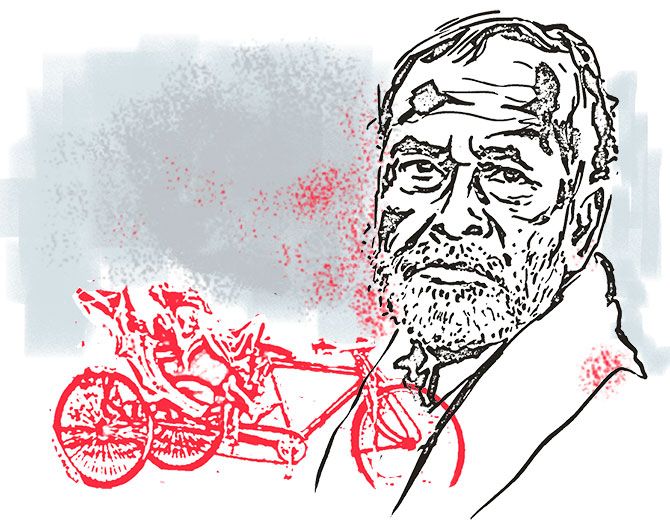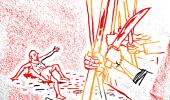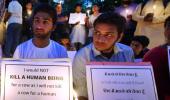'We're faceless while we're alive, invisible when we die.'
Geetanjali Krishna on the plight of the capital's homeless.
Illustration: Dominic Xavier/Rediff.com

His name was Mohammed Abdul Kasim Ali Shaikh.
He'd run away from home at the age of eight, been sexually abused repeatedly and soon realised that the best way to survive was to engage in sex work.
Later, when he contracted HIV, doctors assured him of treatment as long as he furnished his Aadhaar card.
He didn't have one.
So he came to the shelter for the homeless run by the Aman Biradari in Geeta Ghat on the Yamuna's banks where he received medical treatment and embarked on a quest for a dignified life.
He gave up sex work and started plying a rickshaw.
But less than a month ago, an errant vehicle mowed him down while he was asleep on the pavement.
However, Shaikh's end turned out to be different from the fate that awaits most of his homeless brethren.
A couple of months before his death, Karwan-e-Mohabbat, the movement to awaken humanity and develop solidarity among different communities, had made a short film on him as part of an ongoing series on the lives of working class people.
Consequently, many have watched his video and mourned him.
In stark contrast, most of Delhi's estimated 1.8 lakh homeless population faces a bleaker, lonelier end.
A few weeks ago in Yamuna Pushta, I had some macabre conversations with the homeless living there.
We met a man too weak to even pull himself into shade and out of the scorching sun.
"In a day or two, he'll be dead," said Vijay Kumar, desensitised as only someone who has lived long enough on the streets can be.
"We'll complain to the municipality, they'll take their own sweet time to come while he festers in the heat."
"Then they'll arrive with that ominous plastic bag that we all know is likely to be our eventual fate..."
Others with him spoke of how long the unclaimed bodies of the homeless lie in the morgue.
"In fact, we all joke that the only time we'll make it into newspapers is when the municipality publishes a photo of our corpses in the hope that someone comes forward to identify us," said Rajesh Kumar, a rickshaw puller who has lived in Yamuna Pushta for 40 years.
Death, it seemed, was never far from anyone's mind here.
The hard life, exacerbated (or eased, depending on one's standpoint) by alcohol, drugs and gambling, shaved off years from their life expectancy.
Access to medical care was another issue -- as in Shaikh's case, hospitals often ask for Aadhaar before offering treatment.
Later, this was brought home to us when we met a 20-year-old boy too weakened by tuberculosis to even walk.
"I don't have the strength to stand up," he said, "let alone go to a hospital and expect treatment without an ID card."
I left Yamuna Pushta alone that day, as my companion Gufran Alam of Aman Biradari stayed behind to ensure help and treatment for the two sick people we'd encountered.
"Nobody cares about the homeless," said Rajesh Kumar as I left.
"We're faceless while we're alive, invisible when we die."
In that sense, Shaikh was lucky.
The Karwan-e-Mohabbat video has ensured that at least his death was noticed -- even though he'd been faceless, invisible and alone when he was alive.












 © 2025
© 2025